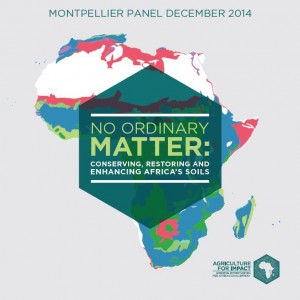4 December 2014. Rome. Agriculture for Impact presented the new Montpellier Panel report ‘No Ordinary Matter: Conserving, Restoring and Enhancing Africa’s Soils’ at the International Fund for Agricultural Development - ahead of World Soil Day on the 5th of December.
This report from the Montpellier Panel argues that if left unaddressed, the cycle of poor land management will result in higher barriers to food security, agricultural development for smallholder farmers and wider economic growth for Africa.
The report is a comprehensive analysis of land management in Africa today, and answers a series of critical questions:
The Montpellier Panel report estimates that nearly 180 million people in Sub-Saharan Africa are hurt by land degradation, which costs about $68 billion in economic losses as a result of damaged soils that prevent crop yields.
Related: (see video panel at 1:13)
The Evolving Sphere of Food Security Rosamond
L. Naylor Published
By Oxford University Press, 416 pages
September 17, 2014
The Evolving Sphere of Food Security seeks to answer two important questions: How do the priorities and challenges of achieving food security change over time as countries develop economically? And how do the policies used to promote food security in one country affect nutrition, food access, natural resources, and national security in other countries? The volume presents the many faces and facets of food security—their symptoms, their roots, and their possible remedies—through the lens of a multidisciplinary group of scholars.
Related:
This report from the Montpellier Panel argues that if left unaddressed, the cycle of poor land management will result in higher barriers to food security, agricultural development for smallholder farmers and wider economic growth for Africa.
The report is a comprehensive analysis of land management in Africa today, and answers a series of critical questions:
- Are donors and governments neglecting soil health in Africa?
- What are the key approaches to restoring Africa’s soils?
- How can improved land management tackle climate change in Africa?
The Montpellier Panel report estimates that nearly 180 million people in Sub-Saharan Africa are hurt by land degradation, which costs about $68 billion in economic losses as a result of damaged soils that prevent crop yields.
“The burdens caused by Africa’s damaged soils are disproportionately carried by the continent’s resource-poor farmers,” the chair of the Montpellier Panel, Professor Sir Gordon Conway, said.
“Problems such as fragile land security and limited access to financial resources prompt these farmers to forgo better land management practices that would lead to long-term gains for soil health on the continent, in favour of more affordable or less labor-intensive uses of resources which inevitably exacerbate the issue.”The Montpellier panel finds that payments for ecosystems services related to sustainable land and watershed management can be part of a suite of needed incentive packages to help combat soil degradation in sub-Saharan Africa. However, famers need more secure land rights and improved education and training, to realise the productive, environmental and social rewards that come from sustainable land management. Furthermore, adequate mechanisms need to be established to ensure that payments reach the participants in a fair and equitable way.
Related: (see video panel at 1:13)
The Evolving Sphere of Food Security Rosamond
L. Naylor Published
By Oxford University Press, 416 pages
September 17, 2014
The Evolving Sphere of Food Security seeks to answer two important questions: How do the priorities and challenges of achieving food security change over time as countries develop economically? And how do the policies used to promote food security in one country affect nutrition, food access, natural resources, and national security in other countries? The volume presents the many faces and facets of food security—their symptoms, their roots, and their possible remedies—through the lens of a multidisciplinary group of scholars.
Related:



No comments:
Post a Comment